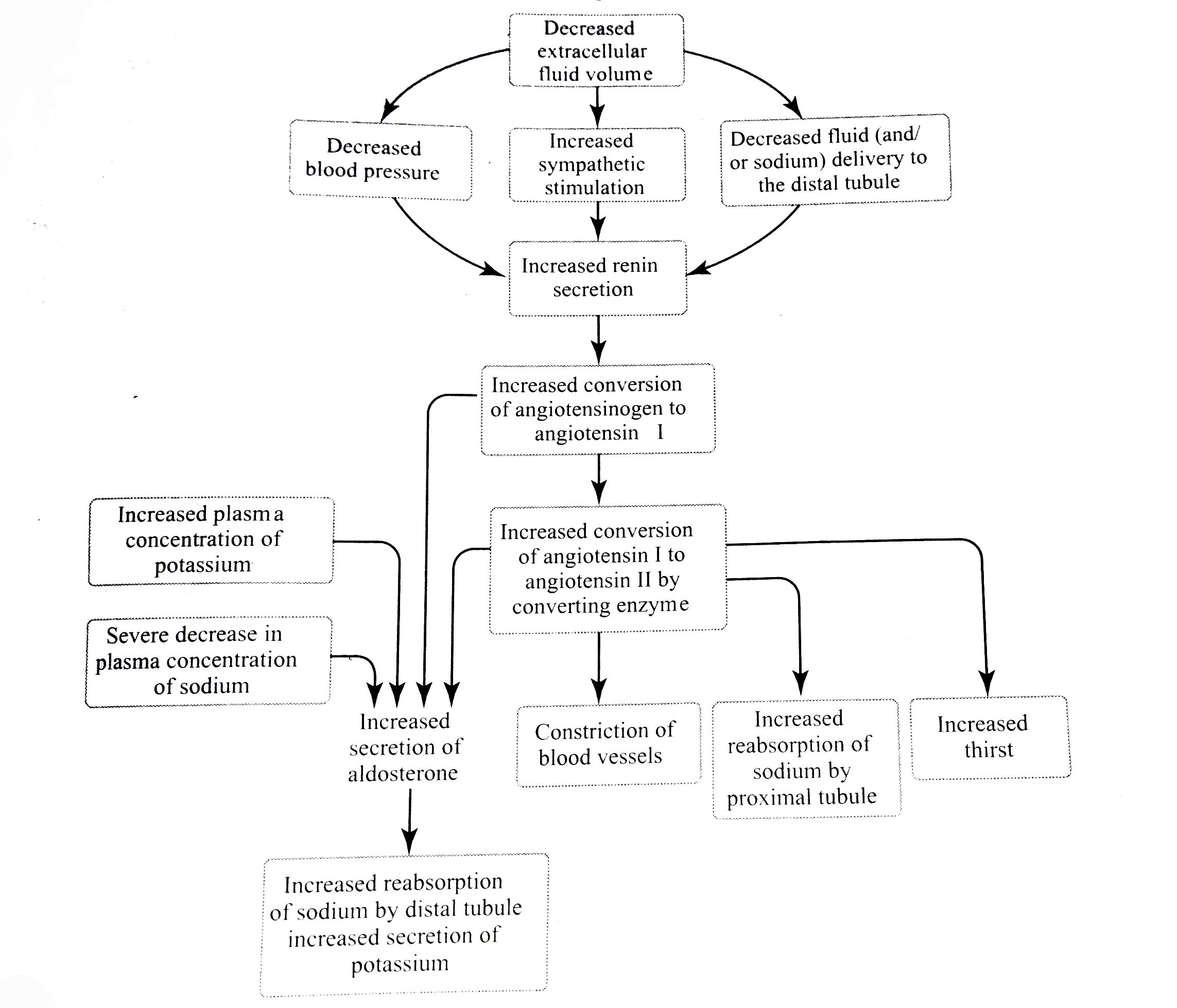Kidney functioning is regulated by hormonal feedback control mechanism. Explain this mechanism.Solution in Tamil
Antidiuretic hormone or Vasopressin, juxtaglomerular upparatus and atrial natriuretic factor regulate the kidney function.
Antidiuretic hormone or Vasopressin: When there is excessive loss of fluid from the body or when there is an increase in the blood pressure, the osmoreceptors of the hypothalamus stimulates the neurohypophysis to secrete the antidiuretic hormone or vasopressin. It facilitates reabsorption of water by increasing the number of aquaporins on the cell surface membrane of the distal convoluted tubule and collecting duct. When the water loss from the body is less or when you drink excess amount of juice, osmoreceptors stop secreting ADH and the aquaporins of the collecting ducts move into the cytoplasm. Hence dilute urine is produced to maintain the blood volume.
Renin angiotensin: Juxtaglomerular apparatus (JGA) is a specialized tissue in the afferent arteriole of the nephron. It consists of macula densa and granular cells. The macula densa cells sense distal tubular flow and affect afferent arteriole diameter. The granular cells secrete an enzyme called renin. A fall in glomerular blood flow, glomerular blood pressure and glomerular filtration rate, can activate JG cells to release renin. This converts angiotensinogen into angiotensin-I. Angiotensin converting enzyme converts angiotensin- to angiotensin-II. Angiotensin-II stimulates Na+ reabsorption in the proximal convoluted tubule by vasoconstriction of the blood vessels and increases the glomerular blood pressure. Angiotensin-I stimulate adrenal cortex to secrete aldosterone that causes reabsorption of Na+,K+ excretion and absorption of water from the distal convoluted tubule and collecting duct. This increases the glomerular blood pressure and glomerular filtration rate. This complex mechanism is generally known as Renin-Angiotensin-Aldosterone System (RAAS).

Atrial natriuretic factor: Excessive stretch of cardiac atrial cells cause an increase in blood flow to the atria of the heart and release Atrial Natriuretic Peptide or Factor (ANF). It travels to the kidney where it increases Na excretion and increases the blood flow to the glomerulus, acting as vasodilator on the afferent glomerular arterioles and as a vasoconstrictor on efferent arterioles. It decreases aldosterone release from the adrenal cortex and decreases release of renin, thereby decreasing angiotensin-II. ANF acts antagonistically to the renin-angiotensin system, aldostenrone and vasopressin.
Topper's Solved these Questions
- EXAMINATION QUESTION PAPER - JUNE 2019BOOK - FULL MARKSCHAPTER - EXAMINATION QUESTION PAPER - JUNE 2019EXERCISE - Bio - Zoology (PART - III)
5 Videos
- DIGESTION AND ABSORPTIONBOOK - FULL MARKSCHAPTER - DIGESTION AND ABSORPTIONEXERCISE - ADDITIONAL QUESTIONS SOLVED ( III. Answer the following Questions )
46 Videos
- EXAMINATION QUESTION PAPER - MARCH 2019BOOK - FULL MARKSCHAPTER - EXAMINATION QUESTION PAPER - MARCH 2019EXERCISE - Bio - Zoology (PART - IV)
4 Videos
Similar Questions
Hemichordates posses the characters of echinoderms and chordates. Write any 3 characters of echinoderms as well as chordates seen in hemichordates.
View SolutionWhat are the uses of food?
View SolutionWrite the kingdom, phylum and class for Pigeon. Write the characteristics of birds that are suitable for flying.
View SolutionAn adenophypophysis hormone which is regulated by feedback mechanism is
View SolutionKidney function is regulated by feedback mechanism involving the _____ and _____
View SolutionWhat is feedback mechanism of hormonic regulation? Take the example of insulin to
explain this phenomenon.
View SolutionKidney functioning is regulated by hormonal feedback control mechanism. Explain this mechanism.
View SolutionExplain the hormones regulating the kidney function.
View SolutionExplain the hormones regulating the kidney function.
View SolutionWhat is feedback mechanism of hormonic regulation? Take the example of insulin to
explain this phenomenon.
View SolutionExplain feedback mechanism regulation of hormone secretion.
View SolutionThe functions of kidney is efficiently regulated by hormonal feed back mechanism involving the hypothalamus, JGA and heart. Br Name the mechanism by which JGA.plays a complex regulatory role.
View SolutionDefine feedback mechanism of hormones.
View SolutionExplain feedback mechanism for regulation of hormonal secretion with the help of one example.
View SolutionMechanism OF Urine Formation || Regulation OF Kidney Function
View Solution
